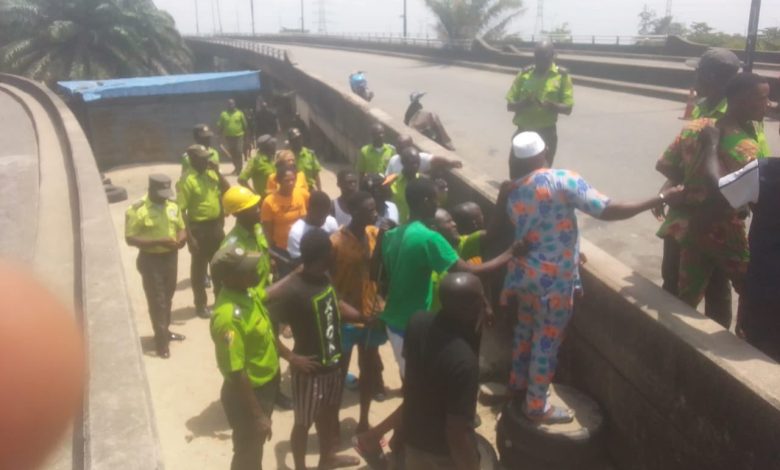A cloud of controversy hangs heavy over the murky world of underbridge dwellings in Lagos. Following the demolition of makeshift apartments beneath Dolphin Estate Bridge in Ikoyi, a video has emerged featuring Gbenga Oluwafemi, a man claiming to be the landlord and leader of a group renting out these unconventional spaces. Oluwafemi, also known as “Mopol,” vehemently denies accusations of charging exorbitant rents, particularly a reported N250,000 (approximately $580) per year. His rebuttal, however, raises more questions than it answers, leaving residents and authorities grappling with the realities of Lagos’ underbelly housing crisis.
The video, posted by News Central on their social media handle, captures Oluwafemi bristling at the allegations. “If I am collecting N250,000 from anybody,” he declares, “I will not be in that place again!” He further asserts his local standing, claiming, “There’s no estate chairman in Dolphin Estate who wouldn’t recognise me.” These statements, while intended to deflect accusations, paint a picture of a man deeply entrenched within the underbridge ecosystem.
The issue of underbridge dwellings is a complex one. Lagos, a megacity teeming with millions, struggles to keep pace with the ever-growing demand for affordable housing. For many, these bridges offer a desperate, if unconventional, solution. Makeshift structures are cobbled together, providing a roof over one’s head, albeit in often precarious and unsanitary conditions.
The reported rent of N250,000, while disputed by Oluwafemi, raises eyebrows. While details are scarce on the exact size and amenities (if any) offered by these underbridge apartments, the figure seems high compared to the average rent for a standard one-bedroom apartment in Lagos, which typically falls between N150,000 and N200,000. This discrepancy fuels speculation that Oluwafemi, and potentially others like him, are exploiting the desperation of these vulnerable residents.
Beyond Mopol: The Murky Waters of Underbridge Renting

The story of Gbenga Oluwafemi, alias “Mopol,” the self-proclaimed underbridge landlord, has sparked outrage and ignited a much-needed conversation about the underbelly of Lagos’ housing market. While the specifics of Mopol’s operation remain murky, his existence highlights a wider, unregulated system where exploitation thrives in the shadows.
The question lingers: is Mopol an anomaly, or does he represent a larger network profiting from the desperation of Lagos’ underclass? Sadly, the answer seems to be the latter. Reports from across the city reveal similar underbridge dwellings, often managed by shadowy figures who dictate rents and living conditions with impunity.
These dwellings vary in size and quality. Some are crude shacks made from salvaged wood and corrugated metal sheets. Others are more elaborate structures, partitioned into individual rooms. Regardless of the construction, all share a common characteristic: a disregard for safety and basic amenities. Ventilation is poor, sanitation facilities are lacking, and the constant hum of traffic poses a health hazard.
Yet, for many Lagosians, these underbridge spaces offer a glimmer of hope, a desperate escape from the even harsher realities of homelessness or overcrowded living arrangements. Young migrants seeking work in the city, petty traders, and those struggling to make ends meet—these are the faces that populate these underbridge communities.
Given their precarious situation, residents are often reluctant to speak out against exorbitant rents or poor living conditions. Fear of eviction, coupled with a lack of viable alternatives, forces them into a position of vulnerability. They become easy prey for individuals like Mopol, who exploit their limited options.
A Housing Crisis in the Shadows
The existence of underbridge dwellings is a symptom of a much larger problem: Lagos’ crippling housing crisis. The demand for affordable housing far outstrips supply, pushing many residents towards desperate measures.
While the government points to ongoing initiatives aimed at increasing housing stock, the pace of development fails to keep up with the ever-growing influx of people into the city. Furthermore, many of these new developments fall outside the affordability range for low-income earners.
The consequences of this crisis are dire. Overcrowding in existing housing units leads to unsanitary conditions and increased health risks. Informal settlements mushroom in flood plains and other hazardous areas. And for some, the only option becomes the perilous existence under bridges.
A Glimmer of Hope?
The demolition of the underbridge dwellings in Dolphin Estate, while leaving residents displaced, can be seen as a step towards addressing the issue. However, a sustainable solution requires a multi-pronged approach.
Firstly, authorities must prioritize the development of truly affordable housing. This means exploring alternative building methods, streamlining bureaucracy to expedite development permits, and offering incentives to private developers to cater to the low-income market segment.
Secondly, the enforcement of existing regulations needs to be strengthened. LASURA and other relevant agencies must actively identify and dismantle these underbridge dwellings. This action, however, needs to be coupled with providing displaced residents with temporary accommodation and support in finding alternative housing solutions.
Thirdly, there’s a need for public awareness campaigns. Educating residents about their rights as tenants and empowering them to report exploitative practices can help dismantle the power dynamic that allows individuals like Mopol to thrive.
Finally, exploring innovative solutions is crucial. Concepts like micro-apartments, co-living spaces, and temporary housing options specifically designed for low-income earners need to be explored and implemented.
The story of Mopol and the underbridge dwellings of Dolphin Estate is a stark reminder that Lagos’ housing crisis has reached a critical juncture. Ignoring this issue is no longer an option. A comprehensive and compassionate approach is needed to ensure that every Lagosian has access to safe, decent, and affordable housing. Only then can the city truly thrive and offer its residents the opportunity for a dignified and secure life.



